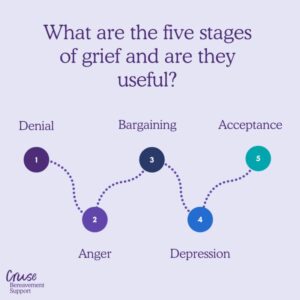Grief involves coping with loss in major life events such as death, divorce, loss of a home or relationship. Everyone grieves differently but there are common responses that can be useful to recognise when facing a loss. Those facing the end of life or a terminal illness often grieve the loss of future hopes and dreams.
__________________________________________________________
Key stages of grief
- Denial: This stage is a defense mechanism that temporarily numbs the shock and pain of a loss.
- Anger: Anger masks the pain you’re feeling and can be directed at others, objects, or even yourself.
- Bargaining: In this stage, you might dwell on “what if” or “if only” thoughts, trying to regain control or negotiate away the pain.
- Depression: This involves an intense, deep sense of sadness that can feel overwhelming and come and go over time.
- Acceptance: This stage means you are acknowledging the loss and learning how to live with it, finding your “new normal.”
____________________________________________________________________________________________________________________________________________
What does grief feel like?
Grief is a deeply personal and multifaceted experience. No two experiences of grief are the same. It can be stressful and difficult. Everyone will go through it at some point in their lives and it is difficult to predict the feelings and reactions that may occur.
Emotionally, grief feels like a wave of intense sadness, numbness, emptiness, anger, guilt, and even moments of happiness as you remember your loved ones or the experiences that were had. Mentally, grief can lead to difficulty remembering, concentrating as well as a sense of feeling overwhelmed. Physically, grief can manifest as headaches, muscle aches, fatigue, changes in your sleep patterns and appetite.
Different types of grief
Grief can take many forms. Grief is often misunderstood and frequently goes unrecognised. Acknowledging and accepting loss is usually the healthiest way to cope. Some common types are:
Anticipatory grief occurs when someone expects a loss, such as when a loved one is terminally ill. People may begin to imagine life without them as a way to prepare emotionally.
Chronic grief involves intense and prolonged feelings of loss that worsen over time, making it difficult to heal or move forward.
Collective grief affects entire communities or groups, often following major tragedies like natural disasters, terrorist attacks, or the death of a public figure.
Find out more about our palliative care services
A deeper look at the stages of grief
There are no set stages of grief as it is non-linear. You can experience aspects of it at different times and they do not happen in one particular order. You may not experience all the stages and while everyone grieves differently, there are some commonalities.
Stage 1: Denial
Denial is often the first reaction to a significant loss, acting as a crucial defense mechanism that helps buffer the initial shock. This stage is not about being ignorant of the reality but rather a temporary refusal to accept the full emotional impact of the situation. It gives your mind time to process the information slowly, numbing the immediate, overwhelming intensity of the grief. This might manifest as disbelief, a feeling that the event isn’t real, or a sense of emotional detachment. As you begin to gradually absorb the reality of the loss, the protective shield of denial will start to wear off, allowing other, more intense emotions to rise to the surface.
Stage 2: Anger
Anger in grief is a masking effect, often hiding the deep pain and sadness underneath. It serves as a way to externalise the intense emotions you carry, providing an outlet for the helplessness you feel. This anger can be directed at anything—other people, doctors, the situation itself, or even inanimate objects. While the rational part of your mind knows these things aren’t to blame, the powerful feelings in that moment can be too intense to control. Anger isn’t always overt rage; it can also be expressed as frustration, resentment, or bitterness. As you process these intense feelings, the anger will begin to subside, allowing for more rational and introspective thoughts to emerge.
Stage 3: Bargaining
In the bargaining stage, you might find yourself dwelling on “what if” or “if only” thoughts, seeking a way to negotiate your way out of the pain. This is a desperate attempt to regain control in a situation where you feel powerless. You may experience a powerful sense of regret or guilt, replaying past events and imagining different outcomes. This stage is marked by feelings of helplessness and vulnerability. For some, bargaining might take the form of making promises to a higher power in exchange for a different reality. Cavendish Homecare can offer a safe space to explore these difficult thoughts without judgment, helping you to understand that these feelings of guilt or regret are a normal part of the grieving process. Our compassionate support can guide you toward self-forgiveness and acceptance.
Stage 4: Depression
This stage involves a deep, all-encompassing sense of sadness that can feel very intense and heavy. It is a natural and necessary part of grieving, as you begin to fully confront the reality of the loss. This is a time of profound sadness, where you may feel confused, empty, and isolated. These feelings can come and go over many months or even years, and the experience is often messy and unpredictable. It’s a period of deep reflection on the loss and its impact on your life, and it’s important to acknowledge and allow these painful emotions without judgment.
Stage 5: Acceptance
Acceptance is often the most misunderstood stage of grief. It does not mean you are “okay” with the loss or that you have moved on completely. Instead, it is the acknowledgement that the loss has occurred and that you are learning to live with it. This stage is about finding a “new normal” and integrating the experience into your life story. It involves a shift from resisting the reality of the loss to adapting to a life without what you have lost. While feelings of sadness may still arise, they are no longer overwhelming, allowing you to find moments of peace, re-engage with life, and build a new path forward.

Photo Credit: Cruse Bereavement
How long does grief last?
Grief can last for as long as it lasts. The symptoms will improve as time passes. However, it is important to remember that grief is not linear, and everyone’s grief and timelines are different. There is also never a set time where someone is ‘done’ with grieving. Your connection with your loved ones or the thing you are grieving just becomes integrated into your ongoing life story and becomes part of who you are.
If you are having trouble coping with the loss and it is interfering with your ability to live your life, it is important to reach out to a therapist or grief counsellor.
How to cope with grief?
Coping with grief takes patience and time. There are things that you can do to make it easier. Practising self-care by prioritising eating well, exercising, sleep and other comforting activities. Sticking to a routine can help you regain a sense of control and regulate your emotions. It is also important to acknowledge your emotions by allowing yourself to feel and express them. This can be through crying, journaling or sharing memories. You may choose to isolate yourself from others, such as in the depression stage. However, it is important to reach out to others to remind yourself of the connections you have.
How will I know when I am done grieving?
Everyone’s grief is unique, but recognising feelings, behaviours and thoughts that can surface can provide reassurance that you are not alone. Working through the range of difficult emotions can give you the strength to move forward while continuing to hold a place in your heart for your loved ones and the experiences you have lost.
Getting support
Grief can be extremely overwhelming. If it is interfering with your ability to live your life or if your symptoms have not improved, consider speaking to a therapist or seeking help. There are several resources and organisations that can help.
CALM: Offers support after suicide services.
Cruse Bereavement: Cruse is the UK’s leading bereavement charity that supports people through one of the most painful times in their lives. With bereavement support, information and campaigning Cruse aim to help people get the help that they need.
Grief Matters UK: They provide a range of support ranging from workshops, one-to-one mentoring and practical support for those dealing with bereavement.
NHS: Your GP can help you explore the different sources of support that may be available to you.
Samaritans: They offer 24/7 emotional support for anyone in distress, including those grieving.
Grief is a complex and deeply personal journey that everyone experiences differently. Understanding the emotions and stages involved can help you navigate this difficult time. Remember, it is okay to seek help and take the time you need to heal. By practising self-care, maintaining routines, and reaching out for support, you can find ways to cope with your grief and move forward while honouring the memory of your loved ones and the experiences you have lost.
How can Cavendish Homecare help?
At Cavendish Homecare we are experts in providing palliative homecare for clients who want to remain in their own homes. When it comes to your health and well-being, choosing the right homecare package is of utmost importance and navigating this process can be overwhelming. With Cavendish Homecare by your side, you’ll have the support you need to remain safely at home while enjoying elevated health and wellbeing.
If you would like to enquire about our homecare services, contact us on, 02030085210 or email us at info@cavendishhomecare.com.

About the Author…
Zahrah Abdullah
Operations Coordinator
Zahrah supports the day-to-day operations, combining her management expertise and care experience to keep things running smoothly and ensure the best outcomes for clients. She’s passionate about making a meaningful difference behind the scenes and helping the team deliver exceptional personalised care.
 Back
Back